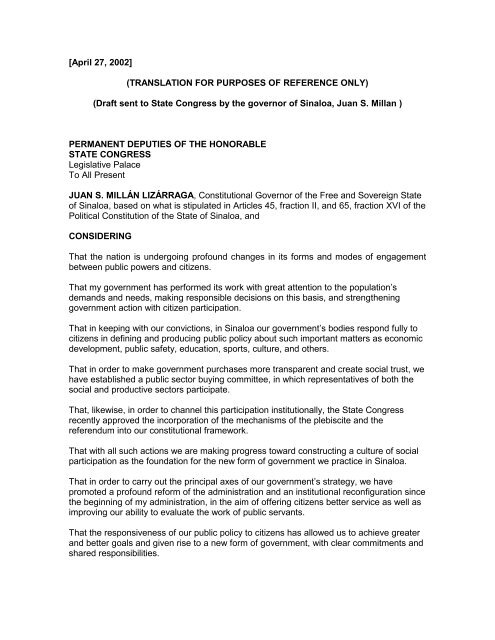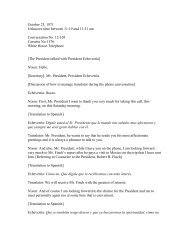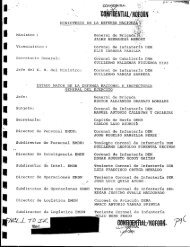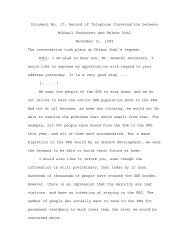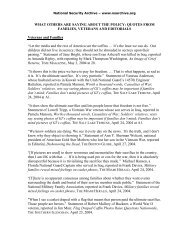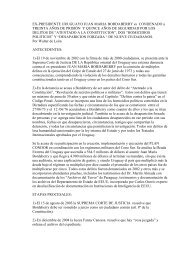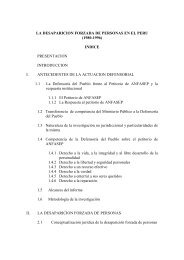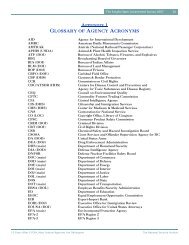(TRANSLATION FOR REFERENCE PURPOSES ONLY)
(TRANSLATION FOR REFERENCE PURPOSES ONLY)
(TRANSLATION FOR REFERENCE PURPOSES ONLY)
You also want an ePaper? Increase the reach of your titles
YUMPU automatically turns print PDFs into web optimized ePapers that Google loves.
[April 27, 2002]<br />
(<strong>TRANSLATION</strong> <strong>FOR</strong> <strong>PURPOSES</strong> OF <strong>REFERENCE</strong> <strong>ONLY</strong>)<br />
(Draft sent to State Congress by the governor of Sinaloa, Juan S. Millan )<br />
PERMANENT DEPUTIES OF THE HONORABLE<br />
STATE CONGRESS<br />
Legislative Palace<br />
To All Present<br />
JUAN S. MILLÁN LIZÁRRAGA, Constitutional Governor of the Free and Sovereign State<br />
of Sinaloa, based on what is stipulated in Articles 45, fraction II, and 65, fraction XVI of the<br />
Political Constitution of the State of Sinaloa, and<br />
CONSIDERING<br />
That the nation is undergoing profound changes in its forms and modes of engagement<br />
between public powers and citizens.<br />
That my government has performed its work with great attention to the population’s<br />
demands and needs, making responsible decisions on this basis, and strengthening<br />
government action with citizen participation.<br />
That in keeping with our convictions, in Sinaloa our government’s bodies respond fully to<br />
citizens in defining and producing public policy about such important matters as economic<br />
development, public safety, education, sports, culture, and others.<br />
That in order to make government purchases more transparent and create social trust, we<br />
have established a public sector buying committee, in which representatives of both the<br />
social and productive sectors participate.<br />
That, likewise, in order to channel this participation institutionally, the State Congress<br />
recently approved the incorporation of the mechanisms of the plebiscite and the<br />
referendum into our constitutional framework.<br />
That with all such actions we are making progress toward constructing a culture of social<br />
participation as the foundation for the new form of government we practice in Sinaloa.<br />
That in order to carry out the principal axes of our government’s strategy, we have<br />
promoted a profound reform of the administration and an institutional reconfiguration since<br />
the beginning of my administration, in the aim of offering citizens better service as well as<br />
improving our ability to evaluate the work of public servants.<br />
That the responsiveness of our public policy to citizens has allowed us to achieve greater<br />
and better goals and given rise to a new form of government, with clear commitments and<br />
shared responsibilities.
That social participation in public tasks is a distinctive sign of the era in which we are living<br />
in Sinaloa, in which that citizens have the right to ask for and receive information about<br />
what public agencies are doing.<br />
That one of Mexico’s most pressing tasks is to produce legislation governing the right to<br />
information in general, and the right of access to information in particular.<br />
That when public information is not accessible to citizens, democratic advances are not<br />
possible; nor is economic development considered from an inclusive point of view, as<br />
something that serves everyone.<br />
That public information belongs to society, such that public institutions are only<br />
depositaries for such information, which we hold only to serve legally established<br />
purposes.<br />
That we are convinced that the greater and more effective citizen knowledge about public<br />
acts becomes, citizen trust in politics and the role of government will also grow.<br />
That we consider that all citizens, regardless of condition, will benefit from the right to<br />
public information, whatever its source.<br />
That freedom of information is a fundamental principle and constitutional value, such that<br />
public functionaries are obligated not only to perform our functions within the framework of<br />
the law, but also to make our acts more transparent and be accountable to citizens.<br />
That it is and has been a firm commitment on my government’s part to initiate this State<br />
Law of Access to Public Information, which constitutes a first ordinance on this matter, and<br />
above all an instrument for strengthening citizen participation in steering and overseeing<br />
government acts.<br />
That in order to learn what opinions society held on this subject, and design our initiative<br />
on the basis of its commentary, we held a series of public fora in which we were graced<br />
with broad participation and a considerable number of proposals.<br />
That we have drawn, on the one hand, on citizen proposals made in the fora we convened<br />
for this purpose and, on the other, on the study and analysis of the best international<br />
practices in this matter, without ignoring the local context in which the Law must be<br />
applied.<br />
That it is necessary to establish the right of all individuals to have access to public<br />
information without requiring them to demonstrate any legitimate interest or personal right<br />
to that information, in keeping with the international democratic standards applicable in this<br />
matter.<br />
That we are required to define a set of minimum information that must be routinely<br />
disclosed by public agencies to reflect the right of access to public information and as a<br />
normal expression of the democratic principle of the State’s publicity.<br />
That we must promote a culture of openness to information that is grounded in the<br />
objective lived reality of Mexico and the state of Sinaloa, where a culture of access to
public information has not yet taken root, such that we must make deep, permanent, and<br />
consistent efforts to change social values and perceptions of this matter.<br />
That we must clarify the principles governing the categories of classified and confidential<br />
information, taking into account the fact that no substantive right is absolute. Rights must<br />
at all times find a harmony with other juridical properties, with the caution that in this case<br />
the right of access to public information is to be the rule, and classified information the<br />
exception, as defined in the terms and figures prevalent in international democratic<br />
standards.<br />
That we need to develop a procedure for excercising the right of access to public<br />
information, including all necessary safeguards for helping and guiding individuals at the<br />
moment when they choose to exercise this right.<br />
That it is prudent to establish a time limit for responses to requests for information, and<br />
establish the principle that consulting public information should be free of charge, as well<br />
as a system of fees for compensating the costs of reproducing, searching for, and<br />
systematizing public information.<br />
That it is also indispensable to include the right of Habeas Data, which is the right of<br />
access to information concerning a particular individual held by public agencies that he<br />
may seek to learn in order to correct it, bring it up to date, or suppress it, and the right to<br />
know the use to which this information will be put.<br />
That we consider it necessary to create a State Commission for Access to Public<br />
Information as an authoritative body with autonomous budgets, operations, and decisionmaking<br />
powers, charged with overseeing compliance with the proposed Law as well as<br />
publicizing and conducting research on the right of access to public information; said<br />
Commission will be composed of three commissioners, of whom one will be president.<br />
That we must design procedures to streamline appeals for amendment brought before the<br />
public agency from which information has ben sought and denied, and appeals for revision<br />
in the second instance brought before the State Commission of Access to Public<br />
Information.<br />
That in this initiative, the sanctions that shall be applied to those who fail to comply with<br />
the provisions of the Access to Public Information Law are specified with crystal clarity.<br />
That in order to favor proper normative efficacy, we must have a system for the gradual<br />
entry into force of the specific sections of the Law itself, in order to carry out an active and<br />
intensive program of training and educating public agencies to routinely disclose<br />
information as well as receive individual requests.<br />
And that democratic life in Sinaloa will be enriched by legislation that both allows citizens<br />
to exercise this right and creates a culture of institutional openness; for which reasons,<br />
based on the constitutional provisions cited above, I submit for consideration the following<br />
initiative for:<br />
ACCESS TO PUBLIC IN<strong>FOR</strong>MATION LAW <strong>FOR</strong> THE STATE OF SINALOA
CHAPTER I<br />
ON GENERAL PROVISIONS<br />
Article 1. This Law is considered part of public policy and seeks to guarantee the right of<br />
every individual in the State of Sinaloa to have access to public information.<br />
Article 2. For purposes of this Law, the right of access to public information shall be<br />
understood as the right of every individual to know and to have access to such information.<br />
All information created by, maintained by, or in the possession of the public agencies<br />
named in this Law shall be considered a public good accessible to any individual in terms<br />
of this Law.<br />
In interpretations of this Law, the principle of the publicity of information shall prevail.<br />
Article 3. To exercise the right to access public information, individuals do not need to<br />
prove any right, legal standing or personal motives, except in the case of Hábeas Data.<br />
With regard to political subjects, only Mexican citizens shall be entitled to this right.<br />
Strictly personal information cannot be renounced or waived, is nontransferable and<br />
cannot be delegated. Therefore, no authority shall communicate it or make it publicly<br />
available.<br />
The individual who obtains information is responsible for its use.<br />
Article 4. All public agencies are subject to the principle of disclosure of their actions and<br />
obliged to guarantee respect for the right of access to public information.<br />
Officially registered political parties and organizations shall report on the funds provided to<br />
them by the State and the municipalities.<br />
Article 5. For purposes of this Law, the following definitions shall apply:<br />
I. COMMISSION. The State Commission for Access to Public Information.<br />
II. RIGHT OF ACCESS TO PUBLIC IN<strong>FOR</strong>MATION. The right of every individual to<br />
access all records and data produced or held by public agencies, in the terms specified in<br />
this Law.<br />
III. HABEAS DATA. The guarantee of protection of personal information held by public<br />
agencies.<br />
IV. PUBLIC AGENCY. The State’s Legislative Branch, the State Congress, the Permanent<br />
Congressional Delegation of State Congress and any of its agencies; the State’s Executive<br />
Branch, the State’s Governor, every dependency and agency of public administration; the<br />
State’s Judicial Branch and its dependencies; the State’s administrative courts; municipal<br />
authorities, the municipal President, every dependency and agency of public municipal<br />
administration; autonomous bodies established by or under the Constitution and state law;<br />
any other bodies of public interest recognized by the Constitution and state laws as such;
properly registered political parties and political organizations; and public and private<br />
bodies, whenever they assist the entities above mentioned and spend public expenses,<br />
receive subsidies or subventions for the exercise of their functions.<br />
V. PUBLIC IN<strong>FOR</strong>MATION. All records, files or data compiled, kept, processed, or held by<br />
public agencies, subject to the provisions of this Law.<br />
VI. PRIVATE IN<strong>FOR</strong>MATION. Public information temporarily subjected to the exemptions<br />
established in this Law.<br />
VII. CONFIDENTIAL IN<strong>FOR</strong>MATION. Information held by public agencies concerning<br />
individuals, which is protected by the individual’s right to privacy.<br />
VIII. PUBLIC INTEREST. The social value assigned to the goals of access and<br />
examination of public information, for the purpose of contributing to individuals’ ability to<br />
make informed decisions in a democratic society.<br />
IX. PERSON. All individuals, group of individuals or entities incorporated in conformity with<br />
the applicable legal provisions.<br />
X. PUBLIC SERVANT. All persons who carry out any activity, in the name of or at the<br />
service of some public agency, regardless of hierarchical position.<br />
Article 6. This Law has the following objectives:<br />
I. To improve the quality of life of individuals and consolidate the democratic<br />
system.<br />
II.<br />
III.<br />
IV.<br />
To optimize the level of community participation in public decision-making in<br />
compliance with international democratic standards.<br />
To guarantee the democratic principle of the publicity of State acts.<br />
To ensure the democratic principle of State accountability<br />
V. To guarantee the protection of personal information held by public agencies.<br />
Article 7. Every public agency shall appoint an officer to be responsible for the requests<br />
for information individuals submit.<br />
Article 8. Those who produce, administer, manage, preserve or maintain public<br />
information shall be responsible for it in the terms stated in this Law.<br />
All information held by public agencies shall be accessible to all individuals, except that<br />
which is considered private or confidential.<br />
Anyone who requests public information has the right to choose whether it shall be<br />
provided orally or in writing, and to obtain reproductions in any medium of the documents<br />
in which it is contained.
Information shall be communicated in the form and state in which it is held by public<br />
agencies. The obligation of public agencies to communicate information does not include<br />
the processing of same, or its delivery in accordance with the requester’s preference.<br />
The loss, destruction, alteration or concealment of public information and of the documents<br />
in which it is contained shall be penalized in the terms stated in this Law and other<br />
applicable legal ordinances.<br />
CHAPTER II<br />
THE MINIMUM IN<strong>FOR</strong>MATION TO BE ROUTINELY DISSEMINATED BY PUBLIC<br />
AGENCIES.<br />
Article 9. Public agencies shall routinely disseminate, at a minimum, the following key<br />
information:<br />
I. Their working structure, the services they provide, the competencies of<br />
each of their administrative units and their functional norms.<br />
II.<br />
III.<br />
IV.<br />
A directory of their public servants, from the level of department head or the<br />
equivalent down.<br />
The monthly salary of each position, including the system for compensation<br />
as established by the Income and Budget Expenditures of the State of<br />
Sinaloa Law (Ley de Ingresos y Presupuesto de Egresos del Estado de<br />
Sinaloa) for the corresponding fiscal year, or the corresponding legal<br />
ordinance.<br />
Opinions, information and arguments recorded in administrative files that<br />
justify the granting of permits, concessions or licences that public agencies<br />
are entitled to grant by law, as well as contracts, biddings and the<br />
procedures for acquiring goods or services.<br />
V. Organizational handbooks and, in general, the legal provisions that enable<br />
public agencies to act as such.<br />
VI.<br />
VII.<br />
VIII.<br />
IX.<br />
The information resulting from audits of the budget expenditures of each of<br />
the public agencies, as well as the minutes of official meetings.<br />
The name of recipients of any public resources, and the use authorized for<br />
those resources, wherever they are destined.<br />
Reports submitted by political parties to the state’s electoral authorities as<br />
soon as they are received by these authorities.<br />
The name, address and electronic mail address, if there is one, of the public<br />
servants responsible for receiving and handling requests for public<br />
information.<br />
X. The policies governing citizen participation, if any, in public authorities’<br />
decision-making processes.
XI.<br />
XII.<br />
The services provided by the agency as well as procedures, requirements<br />
and forms required to have access to the same.<br />
Any other information that may be useful for enabling citizens to exercise<br />
the right of access to public information.<br />
Article 10. All public agencies are obligated to periodically update the information referred<br />
to above. For this purpose, the Commission shall create operative norms and for<br />
establishing simple, comprehensible, clear steps for expediting consultation of the<br />
information routinely disseminated by public agencies.<br />
Article 11. Every public agency shall systematize key information to facilitate access to<br />
same, as well as make it public by all available means.<br />
Likewise, public agencies shall make public all information contained in writing,<br />
photographs, graphs, recordings, electronic or digital records, or any other medium that is<br />
in their possession or under their control.<br />
Article 12. During any meeting in which public decisions are discussed and adopted, a<br />
minute shall be prepared and kept in official archives.<br />
CHAPTER III<br />
PROMOTING OPENNESS<br />
Article 13. All public agencies shall work together with the Commission to provide training<br />
and constant updates to their officers on the subject of the right to information and<br />
theexercise of Hábeas Data by designing courses, seminars, workshops and any other<br />
teaching and training techniques considered appropriate.<br />
Article 14. The Commission shall endeavor to include some content describing the social<br />
importance of the right to access to public information and the right of Hábeas Data in a<br />
democratic society in all study programs and plans in preschool, elementary, secondary<br />
and teacher education as well as in the training of elementary school teachers. For this<br />
purpose, the Commission shall assist educational authorities in the preparing this content<br />
and designing educational materials for these plans and programs.<br />
Article 15. Public and private universities shall endeavor to include topics in which the<br />
importance of the right of access to public information and the right of Hábeas Data can be<br />
debated in their curricular and extracurricular academic activities. The Commission shall<br />
promote, jointly with superior educational institutes, the establishment of a center for<br />
researching, disseminating, and teaching the right of access to public information in order<br />
to promote knowledge of this right throughout society and assist the Commission in the<br />
performance of its duties.<br />
CHAPTER IV<br />
ON CLASSIFIED AND CONFIDENTIAL IN<strong>FOR</strong>MATION<br />
Article 16. The right to access public information shall only be restricted in the terms this<br />
Law establishes for defining private and confidential information.
Article 17. For purposes of this Law, classified information shall be considered that which<br />
is explicitly categorized as such through a resolution by the head officer of the relevant<br />
public agency. Information may only be classified in the following instances:<br />
I. Whenever divulging said information endangers State security; the life, health or<br />
safety of an individual, or the conduct of classified research in a democratic<br />
society;<br />
II.<br />
III.<br />
IV.<br />
Whenever divulging said information could prejudice actions taken to prevent or<br />
prosecute crimes, judicial procedures, tax collection, or any other action taken with<br />
the object of applying the law;<br />
Files pertaining to ongoing judicial or administrative procedures that have taken the<br />
form of a trial when they have not yet producedd a ruling.<br />
Prior investigations or information that pertains to procedures for investigating<br />
crimes.<br />
V. Information related to research or projects the divulgation of which may harm the<br />
interests of the State or jeopardize the conduct of the research.<br />
VI.<br />
VII.<br />
VIII.<br />
IX.<br />
Whenever it is categorized as classified by any Law.<br />
When it is information about individuals that was received by public agencies as<br />
classified in nature or when it is related to intellectual property, patents, and<br />
trademarks held by authorities.<br />
When the information refers to documents or internal communications that are part<br />
of the deliberative process that takes place prior to an administrative decision.<br />
When divulging the information could give improper advantage to an individual and<br />
prejudice a third party.<br />
Article 18. The resolution categorizing information as classified must demonstrate:<br />
a) That the information legitimately falls within the scope of one of the exemptions<br />
established in this Law.<br />
b) That disclosure of such information could effectively endanger legally protected<br />
interests.<br />
c) That the potential harm caused by the disclosure of such information is greater than<br />
the public interest in its disclosure.<br />
Article 19. For purposes of this Law, confidential information is that composed of personal<br />
information in the terms stipulated in the definition provided in Section VII, Article 5 of this<br />
Law.<br />
Article 20. To treat information as classified, the resolution to this effect must indicate: the<br />
source of the information, the justification for its classification, the sections of the
documents that are classified, the period of time during which the information shall be<br />
withheld, and the authority responsible for its preservation.<br />
Sections not expressly treated as classified shall be deemed open to public access.<br />
Information may not be treated as classified in nature when it pertains to investigations of<br />
grave violations of fundamental rights or crimes against humanity.<br />
Article 21. Information treated as classified shall retain this character for twelve years.<br />
Such information shall be opened to the public before the established period has elapsed<br />
if, in the opinion of the Commission, the circumstances that motivated its classification are<br />
no longer relevant.<br />
Likewise, whenever the circumstances for classification remain in force, public agencies<br />
are permitted to make a request to the Commission to extend the period established for its<br />
classification.<br />
Article 22. In the event that classified information becomes publicly known, liability for its<br />
disclosure will be imputed to public servants alone.<br />
CHAPTER V<br />
ON PROCEDURES <strong>FOR</strong> EXERCISING THE RIGHT OF ACCESS TO PUBLIC<br />
IN<strong>FOR</strong>MATION<br />
Article 23. Individuals shall exercise their right before the public agency from which they<br />
seek information.<br />
The request shall be made in writing unless the nature of the subject makes an oral<br />
request possible, in which case the public agency shall transcribe the substance of the<br />
request onto a form, and deliver a copy of the form to the requester.<br />
Article 24. The request in writing shall contain at a minimum the following data:<br />
a) The authority to which the request is addressed.<br />
b) Full name, general information and official identification of the requester.<br />
c) Sufficient detail to identify the information and data required to fulfill the request.<br />
d) Place or means indicated for receipt of the information or notices.<br />
If a request for information is unclear or fails to contain all the requred information, the<br />
public agency must so notify the requester so that he may clarify or complete his request.<br />
In addition, if the requester requires assistance, the office appointed by the public agency<br />
for such purposes must provide it to him.<br />
If a request for information is submitted to an office that is not entitled to disclose this<br />
information or does not have such information within its purview, the receiving office shall<br />
so notify the requester and guide him to the appropriate office.
Article 25. Consultation of information shall be free of charge. Nonetheless, the cost of<br />
reproducing public information or searching for public information not available at the office<br />
where the consultation was made shall enable the public agency to charge reasonable<br />
fees. Said fees shall be provided for in the pertinent Law.<br />
Article 26. Public agencies comprised in this Law ar compelled to provide simple and<br />
comprehensible information to individuals about the paperwork and procedures they must<br />
carry out, the authorities or instances competent to handle these matters, the form in<br />
which they should be carried out, the way in which forms should be filled out, as well as<br />
the agencies from which they may seek guidance, or before which they may make<br />
complaints and seek advice or retification of the service provided to them or the scope of<br />
the functions and jurisdiction of the authority in question.<br />
Article 27. In the event that a request is rejected, notice in writing shall be delivered to the<br />
requester within the following five working days. The refusal of information must provide<br />
sufficient grounds and reasons for refusal.<br />
Article 28. Every request submitted in the terms established in this Law must be fulfilled<br />
within a period no longer than ten working days. A public agency may extend this period<br />
for ten additional working days, in the event that exceptional circumstances make<br />
compiling the requested information difficult. In this case, the public agency must give<br />
notice in writing to the requester before the ten-day period has expired, providing the<br />
reasons it will seek this exceptional extension.<br />
In no case shall the period exceed twenty working days.<br />
Article 29. After the period established in the preceding article has expired, if the request<br />
of information has not been satisfied or the response is deemed ambiguous or incomplete<br />
in the requester’s judgment, she/he may seek from the Commission that it require the<br />
public agency to deliver the information requested in legally appropriate terms.<br />
When a response is not given within the time limits established and in the form requested<br />
because of negligence, the relevant authority shall be compelled to hand over the<br />
information within a time period no greater than ten working days. Said public agency shall<br />
cover all the expenses associated with copying the records that contain the requested<br />
information, as long as this information is not private or confidential.<br />
For purposes of this Law, the authority’s failure to respond shall not be interpreted as the<br />
denial of a request, but as a failure to comply with article 47, section I of the Public<br />
Officers’ Liabilities Law for the State of Sinaloa. (Ley de Responsabilidades de los<br />
Servidores Públicos del Estado de Sinaloa).<br />
CHAPTER VI<br />
HÁBEAS DATA<br />
Article 30. In a democratic society, records that contain confidential information must be<br />
kept in archives prepared for legal and legitimate purposes. With the exception of the<br />
limited provisions for safeguarding public security or individual lives, any information that<br />
might give rise to describmination, such as that pertaining to ethnic or racial origin; skin<br />
color; sexual preference; political opinions; religious, philosophical, or other beliefs; or<br />
participation in an association or labor union shall not be recorded.
Article 31. Archives containing confidential information held by public agencies must be<br />
kept permanently up-to-date and be used exclusively for the legitimate and legal purposes<br />
for which they were created. The purpose of card index to this information, and its use for<br />
this purpose, must be specified and justified, and its creation must be for purpose of<br />
publicity or for allowing interested parties to learn of its contents, such that the interested<br />
party may ensure that :<br />
a) All personal information kept and registered is still relevant to the purpose for which<br />
it was gathered;<br />
b) No personal information is used or disclosed for a purpose incompatible with that<br />
for which it was gathered without the individual’s consent;<br />
c) The period during which this information is kept does not exceed that necessary to<br />
accomplish the purposes for which it was gathered.<br />
Article 32. Any individual who properly identifies himself has the right to be informed<br />
whether any information regarding his person is being processed, to have such information<br />
intelligibly communicated to him without dely, to have pertinent amendments or corrections<br />
made whenever records are illicit, inexact or unjustified, and to know the identity of those<br />
to whom this information is delivered.<br />
Article 33. Public agencies must take the necessary precautions to protect card indexes<br />
from natural threats, such as accidental loss or accidental destruction, as well as from<br />
human threats, such as unauthorized access, secret use of information, or damage by<br />
computer viruses.<br />
CHAPTER VII<br />
ON THE STATE COMMISSION <strong>FOR</strong> ACCESS TO PUBLIC IN<strong>FOR</strong>MATION<br />
Article 34. As the body charged with the authority to promote, disseminate and research<br />
the right of access to public information, an entity shall be created with budgetary,<br />
operational and decision-making autonomy, composed of three commissioners, one of<br />
whom will be appointed Commission president. The head of the State’s Executive Branch,<br />
after taking into consideration society’s proposals in this matter, shall appoint the<br />
commissioners, whose appointment must then be ratified by the State’s Congress or<br />
Permanent Congressional Delegation.<br />
The Commission shall not be defined as belonging to a particular sector in terms of the<br />
laws in this matter, but instead, to perfom its duties best, it establish relationships of<br />
cooperation and coordination with any and all public agencies.<br />
Article 35. The following are requisites for being appointed commissioner:<br />
I. Being a citizen of Sinaloa.<br />
II.<br />
III.<br />
Being no less than thirty years old at the appointment date.<br />
Holding a lawyer’s degree or a degree in any other field of the social sciences, and,<br />
preferrably, also having pursued master’s- or Ph.D.-level studies in media law.
IV.<br />
Enjoying both personal and professional prestige.<br />
V. Not having been head of any political party or association, or a religious minister,<br />
for at least five years, nor having been a public servant at least during the previous<br />
year, in both cases counted from the time of the appointment.<br />
VI.<br />
Not to having been convicted of any intentional crime.<br />
Article 36. Commissioners shall hold this office for a seven-year period and may not be<br />
reelected. Commissioners may not be removed from office during the period of their<br />
apppointment, except for serious cause as determined by the State Congress. This<br />
position is incompatible with any other job or duty, except for teaching and academic<br />
activities.<br />
The president shall be appointed by his peers for a period of two years and may be<br />
reelected.<br />
Article 37. The Commission shall have the following responsibilities:<br />
I. To oversee the implementation of this Law;<br />
II.<br />
III.<br />
IV.<br />
To hear and rule on complaints filed against the acts and decisions of public<br />
agencies regarding requests for access to information;<br />
To establish time limits for the delivery of reports and resolution of proceedings;<br />
To investigate, at individuals’ requests, issues related to complaints about<br />
breaches of this Law;<br />
V. To propose guidelines for charging and waiving fees for access to public<br />
information;<br />
VI.<br />
VII.<br />
VIII.<br />
IX.<br />
To command public agencies to deliver information to requesters as established in<br />
this Law;<br />
To guarantee the proper exercise of the right of Hábeas Data and protection of<br />
personal information;<br />
To solicit and receive funds from national and international organizations;<br />
To carry out the research necessary to best perform its duties;<br />
X. To organize seminars, courses and workshops to promote knowledge of this Law<br />
and the prerogatives of individuals that derive from the right of access to public<br />
information;<br />
XI.<br />
To prepare and publish handbooks, studies and any research to spread knowledge<br />
of this matter throughout society;
XII.<br />
XIII.<br />
XIV.<br />
To prepare an annual budget to be sent to the head of the State’s Executive<br />
Branch to be included in the annual Budget of Expenditures of the State.<br />
To appoint public servants to their offices.<br />
To perpare an internal charter and other internal working norms.<br />
Article 38. The Commission, to fulfill its responsibilities, shall be provided with an<br />
Executive Secretary, a Legal Advisory Department, a Department for Training and Public<br />
Liaison, and the advisors and auxiliary personnel authorized by the plenary of the<br />
Commission, who shall be included in the Income and Budget Expenditures Law for the<br />
State of Sinaloa (Ley de Ingresos y Presupuesto de Egresos del Estado de Sinaloa)<br />
The Executive Secretary and other personnel shall be appointed at a plenary meeting of<br />
the members of the Commission, at the President’s request.<br />
To professionalize and make more effective the support services rendered by the<br />
Commission, a career civil service position shall be established, following the principles of<br />
legality, impartiality, specialization, honesty, loyalty and efficiency. The regulations will<br />
establish and describe in detail the criteria for the selection, permanence, promotion,<br />
training and update of personnel.<br />
Article 39. Before the end of the year’s first quarter, all public agencies must submit a<br />
report corresponding to the previous year to the State’s Commission for Access to Public<br />
Information.<br />
This report must include: the number of requests made to the agency and the information<br />
sought in such requests; the number of requests processed and handled, as well as the<br />
number of requests still pending; cases involving extensions of the period permitted for<br />
response; the time allocated to processing requests and the number of public servants<br />
involved in such activities; the number of instances in which requests for information were<br />
rejected and the grounds for each denial.<br />
Article 40. The president to the Commission, at the beginning of the second ordinary<br />
period of sessions, shall submit to the State’s Congress an annual report on the<br />
Commission’s activities and accomplishments, containing a detailed description of the<br />
information published by the public agencies referred to in this Law; the number of cases<br />
handled, as well as the difficulties faced in complying with this Law. This annual report<br />
shall be published and disseminated widely. The public agencies will be obliged to<br />
distribute the report.<br />
CHAPTER VIII<br />
ON APPEALS <strong>FOR</strong> AMENDMENT AND RECONSIDERATION<br />
Article 41. Individuals affected by authorities’ acts and resolutions denying information<br />
may file an appeal for amendment before the head of the public agency that denied the<br />
information in question.<br />
Article 42. This appeal shall be filed before the office in charge of disclosing the<br />
information in question. This office shall be compelled to issue an administrative decision
on this matter within a maximum period of ten working days counted from the date on<br />
which the appeal was received.<br />
Article 43. In the first instance, the application shall proceed whenever it is filed in due<br />
time and manner.<br />
Article 44. The time limit within which an appeal for amendment must be filed shall be ten<br />
working days counted from the date on which notice of the administrative decision took<br />
effect.<br />
Article 45. An appeal for amendment shall be filed in writing with the following<br />
requirements:<br />
I. It must be addressed to the head officer of the public agency in charge of<br />
disseminating the information in question;<br />
II.<br />
III.<br />
IV.<br />
It must name the individual making the request or, when relevant, those with legal<br />
capacity to represent him by means of a power-of-attorney granted before a public<br />
notary.<br />
It must provide proof of the legal status of the person making the appeal;<br />
It must provide an address where notices may be received and, if necessary, the<br />
names of those appointed to receive them;<br />
V. It must specify the act or resolution under challenge, as well as the authority<br />
responsible for it;<br />
VI.<br />
VII.<br />
VIII.<br />
IX.<br />
It must indicate the date on which notice was given;<br />
It must establish clear and precise facts upon which the challenge is based, as well<br />
as the damage caused by the challenged resolution and the breaches to any legal<br />
precepts it is presumed to have caused;<br />
It must be accompanied by a copy of the resolution being challenged and the<br />
corresponding notice. When the resolution challenged was not resolved within time<br />
limits, a copy of the beginning of the procedure must also be attached;<br />
It must offer and supply evidence related to the challenged resolution, attaching<br />
any relevant documents in the individual’s possession;<br />
X. It must contain the individual’s signature or, when necessary, his fingerprint.<br />
Article 46. If proof of the violation under appeal does not exist, it shall not be necessary to<br />
satisfy formality in section IX of the preceding Article.<br />
Article 47. Authorities may give notice of those errors in the form and substance of a<br />
request that might harm the written appeal, but under no circumstances shall they change<br />
the facts. To amend such errors, a period of three days shall be granted, after which the<br />
following paragraph shall be observed.
The corresponding authority shall issue a resolution within a period no longer than ten<br />
working days.<br />
Whenever the appeal is not filed in writing before the corresponding authority or does not<br />
comply with sections II, III, IV, V, VI, VIII, IX and X of Article 45, and is thus notoriously<br />
improcedent because the time period for its filing has elapsed, it shall be summarily<br />
dismissed.<br />
Article 48. An appeal shall be dismissed whenever:<br />
I. The individual making the appeal abandons it in writing;<br />
II.<br />
III.<br />
The authority responsible for making the challenged resolution corrects or revokes<br />
it, such that no subject for appeal remains before a resolution is issued;<br />
The individual in question dies.<br />
Article 49. The authority in charge of the hearing and resolving the appeal may:<br />
I. Dismiss it;<br />
II.<br />
III.<br />
IV.<br />
Confirm the challenged resolution;<br />
Declare the non-existence or nullity of the challenged resolution;<br />
Revoke, totally or partially, the challenged resolution.<br />
Article 50. Every administrative decision issued by a department in charge of<br />
disseminating information to ratify or revoke an administrative decision regarding access to<br />
information must be legally supported and grounded.<br />
Article 51. Every final resolution shall be in writing. In the event the denial of information is<br />
confirmed, the authority is obliged to indicate which rights of appeal the complainant has<br />
for further challenging this resolution, if this is to his benefit.<br />
Article 52. An appeal for reconsideration may be filed against resolutions that put an end<br />
to an appeal for amendment. This appeal shall be filed before the Commission, in<br />
accordance with the same formalities required for the appeal for amendment.<br />
Article 53. Decisions made by the Commission shall be final for public agencies.<br />
Individuals, however, retain at all times the right to have recourse to judicial authorities to<br />
defend their rights.<br />
CHAPTER IX<br />
ON ADMINISTRATIVE LIABILITIES AND PENALTIES<br />
Article 54. The Commission shall penalize any head officer who fails to comply with the<br />
duty to routinely disseminate information as specified in Article 9 of this Law with a public<br />
admonition. If, after a period of no longer than three months, the information referred to in<br />
Article 9 of this Law has not been made publicly available, this head officer shall be
temporarily suspended from his duties in terms of Article 50 of the of Public Servants’<br />
Liabilities Law for the State of Sinaloa (Ley de Responsabilidades de los Servidores<br />
Públicos del Estado de Sinaloa).<br />
Article 55. Any public servant who hides information to avoid disseminating information<br />
records shall be subject to the provisions listed in Article 47, section I of the Public<br />
Servants’ Liabilities Law for the State of Sinaloa (Ley de Responsabilidades de los<br />
Servidores Públicos del Estado de Sinaloa) and shall be penalized in the terms specified<br />
in Article 50 of this Law.<br />
Article 56. Public servants who destroy, totally or partially, public information under their<br />
care shall be liable in terms of Article 47, section IV of the Public Servants’ Liabilities Law<br />
for the State of Sinaloa (Ley de Responsabilidades de los Servidores Públicos del Estado<br />
de Sinaloa) and shall be penalized in the terms specified in Article 52 of said Law, without<br />
prejudice to pertinent civil or criminal liabilities.<br />
Article 57. Public servants who act negligently when responding requests for access<br />
toinformation, or who do not carry out commands to release records containing<br />
information, shall be subject to the provisions listed in Article 47, section I of the Public<br />
Servants’ Liabilities Law for the State of Sinaloa (Ley de Responsabilidades de los<br />
Servidores Públicos del Estado de Sinaloa) and shall be penalized in the terms specified<br />
in Article 50 of this Law. In the event that the same conduct is repeated, these officers<br />
shall be suspended from six months to three years according to last paragraph of Article<br />
52 of said Law.<br />
Article 58. Public servants who misclassify information shall be orally warned by the<br />
Commission. In the event that the same conduct is repeated, such officers shall be liable<br />
in the terms specified in Article 47, section XIX of the Public Servants’ Liabilities Law for<br />
the State of Sinaloa (Ley de Responsabilidades de los Servidores Públicos del Estado de<br />
Sinaloa) and shall be penalized with a suspension of three to ten years, according to last<br />
paragraph of Article 52 of said Law.<br />
Article 59. Public servants who do not comply with administrative resolutions issued by<br />
the Commission to disclose information in the terms specified in this Law shall be liable in<br />
the terms specified in Article 47, section XIX of the Public Servants’ Liabilities Law for the<br />
State of Sinaloa (Ley de Responsabilidades de los Servidores Públicos del Estado de<br />
Sinaloa) and shall be penalized with a suspension of six months to three years according<br />
to the first part of Article 52 of said Law.<br />
TRANSITORY ARTICLES<br />
Article First. This Law shall be effective as of the day following its publication in the<br />
Official Daily “The State of Sinaloa,” in accordance with the following Articles.<br />
Article Second. The members of the State Commission for Access to Public Information<br />
shall be appointed within the one hundred and eighty days following the publication of this<br />
Law.<br />
Regarding the initial composition of the Commission, and in this occasion alone,<br />
commissioners shall be elected for five, six and seven years respectively, so that<br />
whenever these positions are renewed, the Commission will always have an adequate
combination of experience, knowledge and personal and professional prestige. The<br />
Commission shall prepare its Charter in a period no longer than sixty days counted from<br />
the date of its creation.<br />
From the day of their appointment, the members of the State Commission for Access to<br />
Public Information shall adopt the necessary measures to disseminate this Law across all<br />
social sectors, as well as to make individuals aware of the importance of the right of<br />
access to information and the right of Hábeas Data in a democratic society. For this<br />
purpose, the members of the Commission shall work together with institutions of superior<br />
education, as well as national or international that specialize in such work.<br />
Article Third. The Executive, Legislative and Judicial Branches, within their respective<br />
jurisdictions, shall enact regulations or general agreements with the purpose of creating<br />
the necessary bodies, criteria and procedures for facilitating access to public information to<br />
individuals, as stipulated in this Law. These regulations or agreements should be issued<br />
within a year of the date on which this Law takes effect.<br />
Article Fourth. Individuals may exercise the right of access to public information and the<br />
right to Hábeas Data one year after the date on which this Law takes effect, and once the<br />
Executive, Legislative and Judicial Branches have enacted regulations or agreements that<br />
create the bodies, criteria and procedures referred to in the precedent Article.<br />
Article Fifth. Public agencies shall begin to disseminate the key information referred to in<br />
Article 9 of this Law a year after the date on which this Law takes effect at the latest; and<br />
shall complete this process within a period no longer than two years.<br />
Article Sixth. Every legal provision opposed to this Law shall be derogated.


